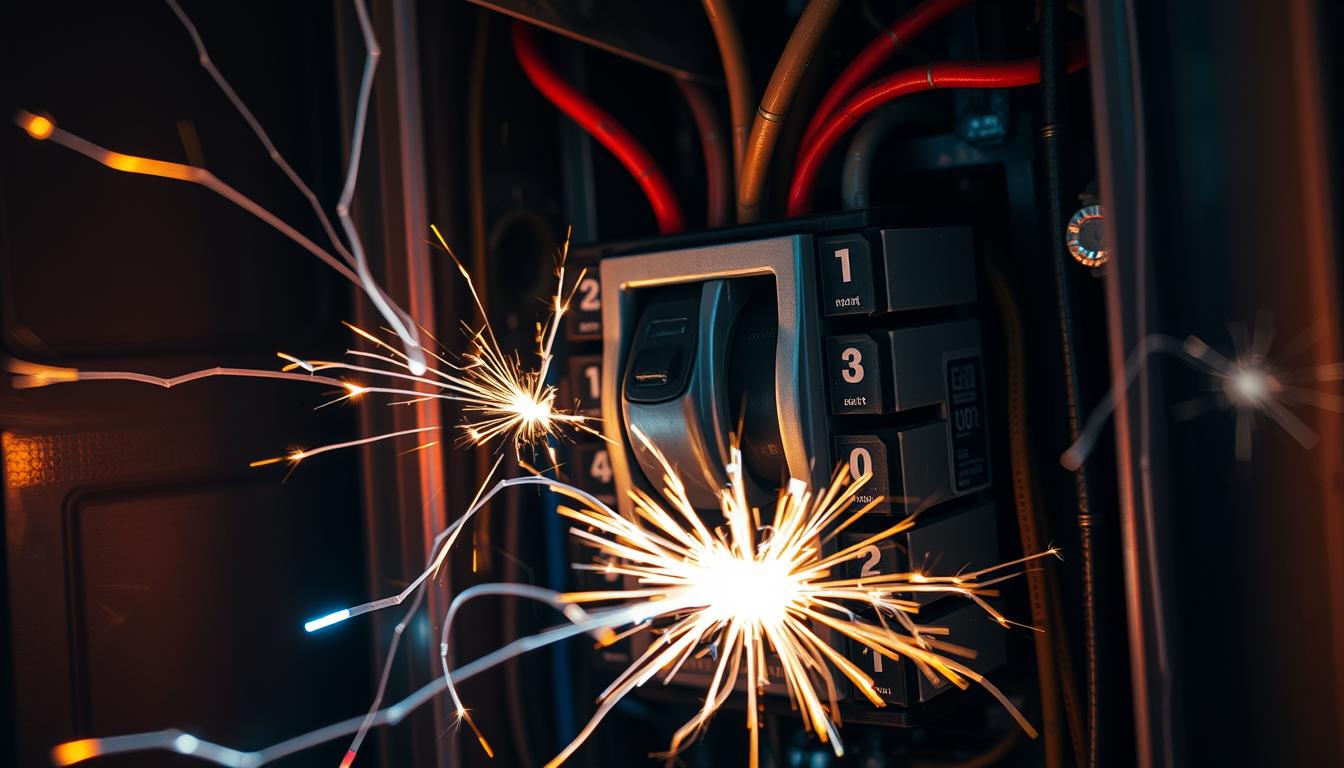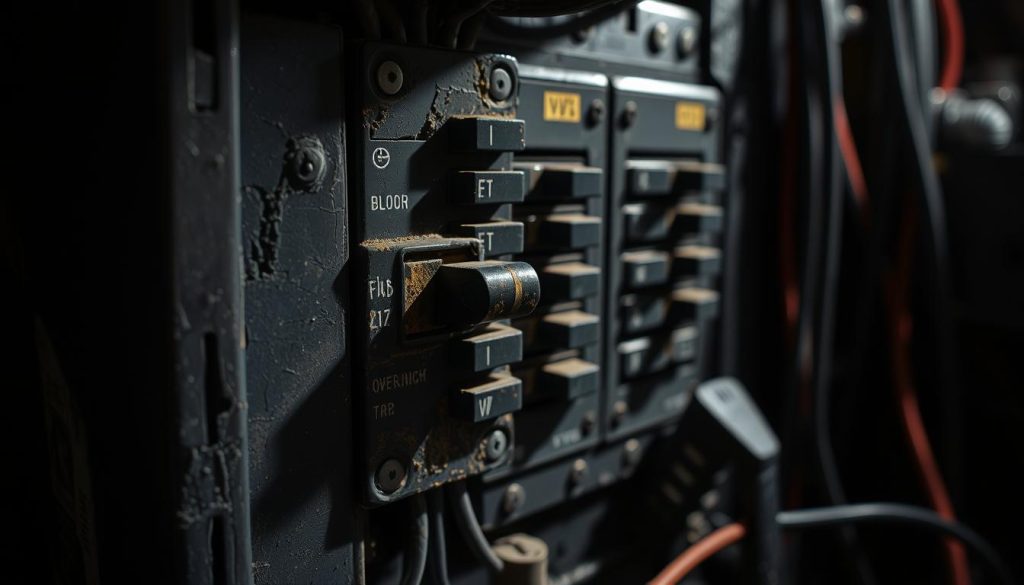
Electrical malfunctions cause 51,000 home fires yearly in the US. These fires result in 500 deaths, 1,400 injuries, and $1.3 billion in property damage. Circuit breakers tripping without cause is a common issue that needs attention.
This problem can signal serious electrical safety concerns. It’s important to address it quickly to prevent potential hazards.
Circuit breakers are key to home electrical safety. They stop electricity flow during overloads or faults. Repeated tripping without cause can be frustrating and needs investigation.
Possible reasons include overloaded circuits, short circuits, and ground faults. Faulty breakers, loose connections, or outdated wiring can also cause this issue.
We’ll explore why breakers trip and how to fix them. You’ll learn about circuit breaker basics and how to spot potential problems.
This knowledge will help you keep your home’s electrical system safe. It can also prevent damage to appliances and property. Let’s tackle this tricky electrical issue together.
Understanding Circuit Breaker Basics
Circuit breakers are vital safety devices in electrical systems. They protect us from fire hazards and appliance damage. These devices shut off power when they detect overloads or short circuits.
To understand why breakers trip with nothing plugged in, we must know how they work. We’ll explore the common causes behind their activation.
How Circuit Breakers Work
Each home circuit has a specific amperage capacity. The power demand of connected devices shouldn’t exceed this limit. When current surpasses the limit, the breaker trips to prevent overheating.
A bimetallic strip or electromagnetic coil triggers this safety mechanism. It responds to excessive current by breaking the circuit.

Common Causes of Circuit Breaker Tripping
Breakers can trip even when no appliances are drawing power. Several factors can cause this to happen.
- Overloaded circuits: Running too many high-power appliances simultaneously on the same circuit can overload it, causing the breaker to trip.
- Short circuits: Damaged wire insulation or faulty appliances can cause a short circuit, where the hot wire comes into contact with the neutral wire, leading to excessive current flow.
- Ground faults: When a hot wire touches a grounded surface, such as a metal outlet box, it can cause a ground fault, making the breaker trip to prevent electric shock hazards.
- Faulty wiring: Loose connections, outdated wiring, or improperly installed electrical components can contribute to breaker tripping.
Power surges, lightning strikes, and faulty appliances on other circuits can also trigger breakers. The table below summarizes common causes and their potential consequences:
| Cause | Description | Potential Consequences |
|---|---|---|
| Overloaded Circuit | Circuit draws more power than its designed capacity | Overheating, appliance damage, fire hazard |
| Short Circuit | Hot wire touches neutral wire, causing excessive current flow | Overheating, appliance damage, fire hazard |
| Ground Fault | Hot wire contacts ground wire or metal outlet box | Electric shock hazard, appliance damage |
| Faulty Wiring | Loose connections, outdated wiring, improper installation | Overheating, fire hazard, inconsistent power supply |
According to the National Fire Protection Association, electrical malfunctions are responsible for an estimated 13% of home structure fires, emphasizing the importance of properly functioning circuit breakers and addressing any tripping issues promptly.
Troubleshooting a Tripping Breaker
A tripping circuit breaker with nothing plugged in signals an electrical problem. Start by turning off all switches and devices on the affected circuit. Reset the breaker and check for visible damage.
Use a multimeter to test continuity and voltage. This can help find the issue’s source.
Overloaded Circuits
Overloaded circuits often cause breaker tripping. Residual heat from high-power devices can trigger tripping even after unplugging appliances.
In an old New Hampshire house, a circuit breaker tripped during humid weather. This suggested an overloaded circuit made worse by environmental factors.
Short Circuits and Ground Faults
Short circuits can cause sudden electricity surges that trip breakers. Damaged wire insulation, faulty appliances, or pests can lead to these issues.
Ground faults allow current to flow to grounded surfaces. Water exposure or improper wiring often cause these problems.
In the old house, water leaks or rodents might have caused a short circuit. This is common in older buildings.
| Fault Type | Potential Causes | Detection Methods |
|---|---|---|
| Earth Fault | Tiny current drain to earth | Earth fault detection devices |
| Overcurrent | Too many appliances | Trip switch turns off |
| Arcing Issues | Earth leakage or short circuit | Trip switch turns off |
Faulty Breakers and Loose Connections
Breakers can wear out over time, especially if they trip often. Loose or corroded connections may cause arcing and intermittent tripping.
Test RCD, RCB, RCCB, and RCBO devices every 6 months. This ensures they work properly and prevents failures from repeated tripping.
Wiring Issues and Outdated Systems
Old, damaged, or poorly repaired wiring can expose conductors. This increases the risk of electrical faults.
The New Hampshire house was renovated recently, ruling out knob-and-tube wiring. However, other wiring problems might still exist.
Upgrading electrical panels can help meet increasing power demands. Modern service panels offer higher capacity and better safety features.
Breaker Tripping With Nothing Plugged In: Potential Causes and Solutions
A tripping circuit breaker without any plugged-in devices can be frustrating and dangerous. Damaged input wires or faulty wiring often cause current leakage. A professional electrician should locate and fix the problem to ensure safety.
A malfunctioning circuit breaker might also be the culprit. Breakers can wear out due to age, heat, dust, or internal failures. An electrician should test, replace, or upgrade the breaker to maintain system integrity.
“Electrical safety should always be a top priority. When dealing with persistent breaker tripping without an apparent cause, it is crucial to consult with experts to identify and resolve the underlying issue.”
Here are some statistics on breaker tripping causes:
- Overloaded circuits cause 60% of trips, even without plugged-in devices.
- Damaged or faulty wires account for 25% of protective measure trips.
- Ground faults occur 50% more in high-moisture areas than in dry environments.
| Cause of Breaker Trip | Percentage of Occurrence |
|---|---|
| Short circuits | 35% |
| Power surges (internal) | 20% |
| Power surges (external) | 10% |
| Faulty appliances | 15% |
Professional electricians offer long-term solutions for breaker tripping issues. Their services have a 90% effectiveness rate in resolving these problems.
Safety should be the top priority when dealing with breaker tripping. Consult experts to identify and fix the underlying cause. Addressing issues like damaged wires and faulty breakers ensures proper system function and prevents hazards.
Conclusion
We’ve explored why circuit breakers trip when nothing’s plugged in. Causes include overloaded circuits, short circuits, ground faults, faulty breakers, and wiring issues. Troubleshooting involves checking connections, testing components, and identifying potential hazards.
Electrical work can be dangerous. It’s best to consult a professional electrician for safety. They ensure the integrity of your electrical system.
Regular inspections and upgrades are key to preventing breaker tripping. This helps maintain a safe, reliable electrical setup in your home. Address issues promptly to avoid potential hazards.
Prioritize your electrical system’s safety and functionality. Understand common causes of breaker tripping. Know when to troubleshoot yourself and when to call experts. This protects your home from electrical hazards.
By taking these steps, you’ll enjoy a reliable, efficient electrical setup for years. Your family’s safety and home’s functionality will be secure.







